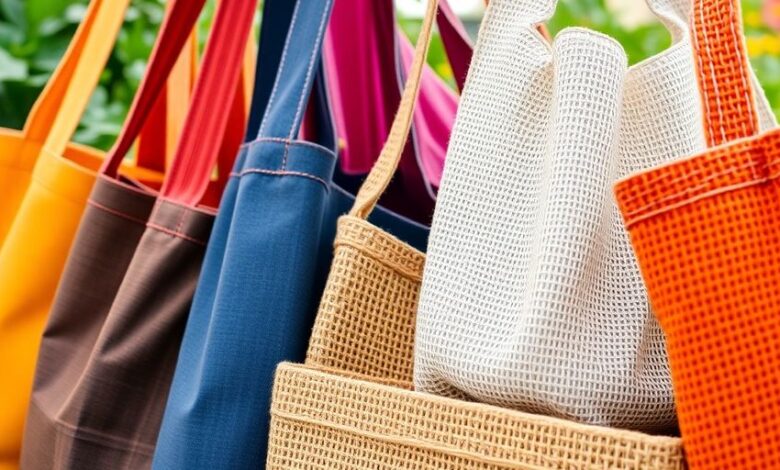
In today’s world, where sustainability is becoming increasingly important, reusable grocery bags have gained popularity as an alternative to single-use plastic bags. These bags come in various materials, each with its pros and cons. Understanding the materials used in these bags can help consumers make informed choices that align with their values. In this article, we will explore five common materials used in the manufacture of reusable grocery bags and discuss their benefits and drawbacks.
Key Takeaways
- Cotton bags are durable and biodegradable but require a lot of water to produce.
- Polyester bags are strong and often made from recycled materials but are not biodegradable.
- Jute is eco-friendly and strong but can degrade quickly in harsh conditions.
- Non-woven polypropylene bags are affordable and practical but are made from petroleum-based materials.
- Silicone bags are versatile and heat-resistant but can be more expensive and are not biodegradable.
1. Cotton
Cotton bags are super common when you’re talking about reusable grocery bags. People like them because they’re natural and biodegradable. These bags usually come from either organic or regular cotton fibers, and they’re often seen as a good choice for the environment.
Cotton bags are among the most widely recognized reusable bag options.
Here’s why cotton bags are a solid choice:
- They’re tough and can handle being used over and over.
- You can wash them easily, which is great for keeping things clean.
- Cotton is a natural fiber, so it’s a renewable resource if grown the right way.
Cotton bags are ideal for individuals who value a natural and sustainable option but should be used frequently to offset their production footprint.
But, there are some downsides to consider:
- Growing cotton needs a lot of water and pesticides. For example, it takes about 20,000 liters of water to make just one kilogram of cotton. That’s a problem in places where water is scarce.
- Making cotton bags can use a lot of energy, which kind of defeats the purpose of being eco-friendly. Choosing reusable grocery bags can help reduce waste.
2. Polyester
Polyester bags are a common synthetic option, often striking a balance between cost and how long they last. Many are now made from recycled plastic bottles (PET), giving new life to materials that might otherwise end up as waste. I’ve seen a lot of these around, and they seem pretty reliable.
Here’s a quick rundown:
- They’re pretty tough and don’t tear easily.
- Using recycled PET helps reduce waste.
- Polyester doesn’t soak up water as easily as some other materials.
However, there are some downsides:
- Polyester isn’t biodegradable, so it needs to be recycled.
- Making polyester can use a lot of energy and involve some chemical processes.
I think polyester bags are a decent choice, especially if they’re made from recycled stuff. They’re practical and can help cut down on waste, but it’s important to recycle them when you’re done with them. Adopting sustainable living practices is important.
3. Jute

Jute, often called the “golden fiber,” is a natural material frequently used for reusable grocery bags. It’s known for its strength and kind of rustic look, which makes it popular with people who care about the environment.
Jute bags are pretty cool, and here’s why:
- Eco-Friendly Production: Jute needs very little water, pesticides, and fertilizers to grow, especially when you compare it to other natural fibers like cotton. This makes it a more sustainable choice right from the start.
- Biodegradable and Renewable: Jute is plant-based, so it breaks down naturally. Plus, it grows quickly, which means it’s a renewable resource. You can even use them as planters for growing garden vegetables when you’re done with them!
- Strong and Durable: Jute fibers are tough, so the bags can handle heavier stuff without ripping. This is super useful when you’re carrying a lot of groceries.
Jute bags will last for about 4 years and if used correctly will replace over 600 single bags.
But, there are a couple of downsides:
- Limited Washability: Jute bags aren’t as easy to clean as cotton or synthetic bags. If they get too wet, they can lose their shape or get weaker. So, you have to be a bit careful with them.
- Shorter Lifespan: While they’re durable, jute bags can wear out faster if they’re left in the sun or rain for too long. So, it’s best to store them in a dry place.
Overall, jute bags are great for light grocery trips or just casual shopping. They give you a good mix of being sustainable and useful.
4. Non-Woven Polypropylene

Non-woven polypropylene (NWPP) bags are super common these days, and you see them everywhere. They’re a popular choice for reusable grocery bags, mostly because they don’t cost a lot and can be used for just about anything. These bags are light, you can change them up to look however you want, and companies use them to get their name out there.
Advantages:
- They’re cheap to make, so stores and shoppers both like them.
- Even though they don’t weigh much, they’re pretty strong and can hold a lot of stuff.
- They don’t let water through easily, which is good for keeping your groceries dry.
Disadvantages:
- Polypropylene comes from oil, which isn’t great for the planet.
- They don’t break down naturally, so they can stick around in landfills for a long time.
NWPP bags aren’t the best for the environment, but they’re a practical and affordable option if you’re trying to save money and still use something reusable.
5. Silicone
Silicone is making its way into the reusable bag scene, though it’s not as common as cotton or polyester. These bags are gaining popularity because they’re super flexible and can really take a beating. You can use them for groceries, sure, but also for storing leftovers or even packing stuff for a trip. They’re pretty versatile.
Advantages
- Silicone can handle high temperatures, so you can toss these bags in the microwave or dishwasher without a second thought. That’s a big plus for convenience.
- They’re incredibly durable. Silicone bags resist wear and tear like champs, often outlasting bags made from other materials. This means you won’t be replacing them anytime soon.
- Most silicone bags are made from food-grade silicone, which means they’re safe for storing food. No need to worry about harmful chemicals leaching into your snacks.
Challenges
- Making silicone bags is more expensive than making, say, a polyester bag. That higher production cost usually translates to a higher price tag for the consumer. If you’re on a tight budget, silicone might not be the best option.
- Silicone isn’t biodegradable. While it’s durable and long-lasting, it won’t break down naturally in a landfill. This poses similar disposal problems as other synthetic materials.
Silicone bags are a solid choice if you’re looking for something that will last a long time and can handle a variety of uses. Just be prepared to pay a bit more upfront, and consider the environmental impact when it’s time to dispose of them.
Wrapping It Up
In the end, picking the right material for reusable grocery bags really comes down to what you need and what you care about. Cotton and jute bags are great for those who want something natural and biodegradable, but they do require a lot of resources to make. On the flip side, synthetic options like polyester and non-woven polypropylene are tough and budget-friendly, but they’re not the best for the environment since they don’t break down easily. Then there’s silicone, which is super durable and versatile, but it can be pricier. The bottom line? To really make a difference, use these bags as much as you can and choose materials that fit your lifestyle and values.
Frequently Asked Questions
What are reusable grocery bags made of?
Reusable grocery bags can be made from several materials like cotton, polyester, jute, non-woven polypropylene, and silicone.
Are cotton bags eco-friendly?
Yes, cotton bags are eco-friendly because they are made from natural fibers and can decompose at the end of their life.
How strong are polyester bags?
Polyester bags are very strong and durable, making them great for carrying heavy items without tearing.
Can jute bags be washed?
Jute bags are not easy to wash because they can lose their shape and strength if they get too wet.
Is silicone safe for food storage?
Yes, silicone bags are made from food-grade materials and are safe for storing food.
What is non-woven polypropylene?
Non-woven polypropylene is a lightweight and affordable material used for reusable bags, known for being durable and water-resistant.



